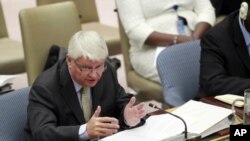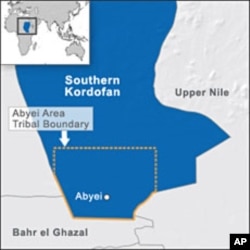The United Nations is calling on Sudan and South Sudan to comply with redeployment agreements and to immediately withdraw their forces from the disputed and oil-rich Abyei region.
The new U.N. peacekeeping chief, Hervé Ladsous, told the 15-member U.N. Security Council Thursday that a contingent of Ethiopian troops deployed to Abyei to deter clashes between the two Sudanese sides has not observed any significant progress on the withdrawal of armed forces from the area.
“The Sudan Armed Forces and the SPLM are present respectively in the north and south of the Kiir/Bahr al-Arab river," said Ladsous. "UNISFA has not observed significant movements across the river or skirmishes between the two forces, however the climate remains tense.”
Ladsous, who took up his duties four days ago, said the withdrawal is essential to facilitate the return of the more than 100,000 internally displaced persons, to create conditions for a peaceful seasonal migration of the Misseriya tribe, and to build confidence among the parties.
He also reminded Khartoum and Juba that under the terms of a June 20th agreement, their armed forces are to withdraw from Abyei and the Ethiopian force, known by its acronym UNISFA, is to be the sole military presence in Abyei.
Almost 1,800 of the 4,200 mandated UNISFA troops are on the ground in Abyei and have begun operations.
South Sudan’s envoy, David Buom Choat, told the council that his country has fully complied with its obligations and has redeployed its troops south of Abyei to Warap State.
“The SAF must now withdraw immediately from the Abyei area," he said. "We respectfully request the Council to set a deadline for this withdrawal, and to hold whoever violates the deadline accountable.”
Sudan’s ambassador, Daffa-Alla Elhag Ali Osman, said his government’s forces did not enter Abyei in order to remain there indefinitely and would pull out. But he cautioned that their withdrawal must be in tandem with the full deployment of the UNIFSA forces in order to avoid a security vacuum in the area.
The fate of Abyei was left undecided when South Sudan split from the north in July following a January referendum on independence. A referendum was originally also planned in Abyei for the population to determine which country they wanted to belong to, but the vote was never held, mainly because of disputes over who would be eligible to vote.





